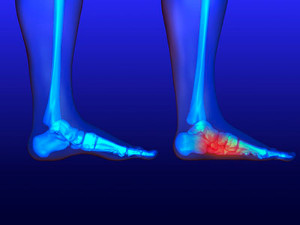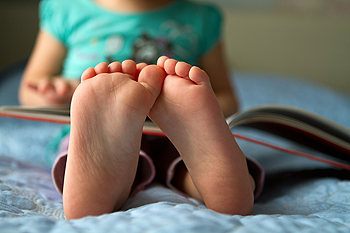NJ (908) 688-5577
NY (212) 737-2528
 The second and third toes may be impacted by the medical condition that is known as hammertoe. The toe bends at the joint in an upward position, and often resembles a hammer. It is considered to be a deformity, and in severe cases, surgery may be necessary to permanently straighten the toes.There are two stages of hammertoe. When this condition is first noticed, the joints can be flexible, and relief may be found when the correct shoes are worn. Additionally, there are specific stretches that can be performed which may help to strengthen the toes. When the condition becomes more severe, it is referred to as rigid hammertoe, and the joints are unable to move. A common reason why this condition may develop can consist of wearing shoes that do not have adequate room for the toes to move freely in. Additionally, genetic factors may lead to developing hammertoe. Please consult with a podiatrist who can properly diagnose this ailment, and suggest treatment options that are correct for you.
The second and third toes may be impacted by the medical condition that is known as hammertoe. The toe bends at the joint in an upward position, and often resembles a hammer. It is considered to be a deformity, and in severe cases, surgery may be necessary to permanently straighten the toes.There are two stages of hammertoe. When this condition is first noticed, the joints can be flexible, and relief may be found when the correct shoes are worn. Additionally, there are specific stretches that can be performed which may help to strengthen the toes. When the condition becomes more severe, it is referred to as rigid hammertoe, and the joints are unable to move. A common reason why this condition may develop can consist of wearing shoes that do not have adequate room for the toes to move freely in. Additionally, genetic factors may lead to developing hammertoe. Please consult with a podiatrist who can properly diagnose this ailment, and suggest treatment options that are correct for you.
Hammertoes can be a painful condition to live with. For more information, contact Glenn Davison, DPM of Advanced Podiatry. Our doctor will answer any of your foot- and ankle-related questions.
Hammertoe
Hammertoe is a foot deformity that occurs due to an imbalance in the muscles, tendons, or ligaments that normally hold the toe straight. It can be caused by the type of shoes you wear, your foot structure, trauma, and certain disease processes.
Symptoms
Risk Factors
Treatment
If you have hammertoe, you should change into a more comfortable shoe that provides enough room for your toes. Exercises such as picking up marbles may strengthen and stretch your toe muscles. Nevertheless, it is important to seek assistance from a podiatrist in order to determine the severity of your hammertoe and see which treatment option will work best for you.
If you have any questions, please feel free to contact our offices located in Union, NJ and New York . We offer the newest diagnostic and treatment technologies for all your foot care needs.
 People that do not have an arch in their foot, or possibly a low arch, are said to have the medical condition that is known as flat feet. Most people are born with flat feet, and the arch typically develops after several years. Patients who have had a foot injury, have gained weight suddenly, or wear shoes that do not fit correctly may develop flat feet. Additionally, patients who have medical conditions that can include diabetes, rheumatoid arthritis, or who have suffered a stroke, may be prone to having flat feet. This ailment may cause the feet to feel achy for the majority of the time, and it can be difficult to accomplish daily activities. Mild relief may be found when gentle calf stretches are frequently practiced, and it may be beneficial to wear custom made orthotics in the shoes. If you have fallen arches, or flat feet, please speak with a podiatrist who can offer the best treatment options that are correct for you.
People that do not have an arch in their foot, or possibly a low arch, are said to have the medical condition that is known as flat feet. Most people are born with flat feet, and the arch typically develops after several years. Patients who have had a foot injury, have gained weight suddenly, or wear shoes that do not fit correctly may develop flat feet. Additionally, patients who have medical conditions that can include diabetes, rheumatoid arthritis, or who have suffered a stroke, may be prone to having flat feet. This ailment may cause the feet to feel achy for the majority of the time, and it can be difficult to accomplish daily activities. Mild relief may be found when gentle calf stretches are frequently practiced, and it may be beneficial to wear custom made orthotics in the shoes. If you have fallen arches, or flat feet, please speak with a podiatrist who can offer the best treatment options that are correct for you.
Flatfoot is a condition many people suffer from. If you have flat feet, contact Glenn Davison, DPM from Advanced Podiatry. Our doctor will treat your foot and ankle needs.
What Are Flat Feet?
Flatfoot is a condition in which the arch of the foot is depressed and the sole of the foot is almost completely in contact with the ground. About 20-30% of the population generally has flat feet because their arches never formed during growth.
Conditions & Problems:
Having flat feet makes it difficult to run or walk because of the stress placed on the ankles.
Alignment – The general alignment of your legs can be disrupted, because the ankles move inward which can cause major discomfort.
Knees – If you have complications with your knees, flat feet can be a contributor to arthritis in that area.
Symptoms
Treatment
If you are experiencing pain and stress on the foot you may weaken the posterior tibial tendon, which runs around the inside of the ankle.
If you have any questions please feel free to contact our offices located in Union, NJ and New York . We offer the newest diagnostic and treatment technologies for all your foot and ankle needs.
Diabetes is a common ailment many people are afflicted with. It is important to take proper care of the feet, and this especially applies to diabetic patients. Several complications may develop on the feet if there are bruises or wounds that are left unattended. A cut may develop into a foot ulcer, which may lead to possible amputation, if left untreated. It may be difficult to feel temperature changes or existing cuts, and this may be a result of neuropathy. It is beneficial to address symptoms that can affect the feet, which may be helpful in preventing painful foot conditions. These signs can include swollen feet, sores and cuts that heal slowly, and there may be a burning sensation. If you have diabetes, it is strongly suggested that you are under the care of a podiatrist who can properly diagnose and monitor this condition.
Diabetic foot care is important in preventing foot ailments such as ulcers. If you are suffering from diabetes or have any other concerns about your feet, contact Glenn Davison, DPM from Advanced Podiatry. Our doctor can provide the care you need to keep you pain-free and on your feet.
Diabetic Foot Care
Diabetes affects millions of people every year. The condition can damage blood vessels in many parts of the body, especially the feet. Because of this, taking care of your feet is essential if you have diabetes, and having a podiatrist help monitor your foot health is highly recommended.
The Importance of Caring for Your Feet
Patients with diabetes should have their doctor monitor their blood levels, as blood sugar levels play such a huge role in diabetic care. Monitoring these levels on a regular basis is highly advised.
It is always best to inform your healthcare professional of any concerns you may have regarding your feet, especially for diabetic patients. Early treatment and routine foot examinations are keys to maintaining proper health, especially because severe complications can arise if proper treatment is not applied.
If you have any questions please feel free to contact our offices located in Union, NJ and New York . We offer the newest diagnostic and treatment technologies for all your foot and ankle needs.
 It is important for people of all age groups to maintain proper foot care. Research has indicated It is in the best interest of the child to begin early, and this can be accomplished by walking barefoot while indoors. This can often help the overall foot to become stronger as the toes grasp the floor. When it is time to walk outdoors, the first pair of shoes can be purchased. After your child’s feet are properly measured, the correct size shoe can be tried on. It is beneficial for these shoes to consist of a flexible material which allows their feet to stay cool. If you would like additional information about how to properly fit shoes for your child, please consult with a podiatrist who can offer helpful techniques.
It is important for people of all age groups to maintain proper foot care. Research has indicated It is in the best interest of the child to begin early, and this can be accomplished by walking barefoot while indoors. This can often help the overall foot to become stronger as the toes grasp the floor. When it is time to walk outdoors, the first pair of shoes can be purchased. After your child’s feet are properly measured, the correct size shoe can be tried on. It is beneficial for these shoes to consist of a flexible material which allows their feet to stay cool. If you would like additional information about how to properly fit shoes for your child, please consult with a podiatrist who can offer helpful techniques.
The health of a child’s feet is vital to their overall well-being. If you have any questions regarding foot health, contact Glenn Davison, DPM of Advanced Podiatry. Our doctor can provide the care you need to keep you pain-free and on your feet.
Tips for Keeping Children's Feet Healthy
If you have any questions, please feel free to contact our offices located in Union, NJ and New York . We offer the newest diagnostic and treatment technologies for all your foot care needs.